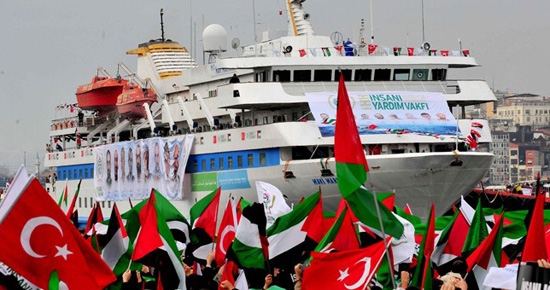There is strong evidence for Turkish governmental involvement in the Gaza flotilla incident, including the office of Prime Minister Tayyip Erdogan. As this report demonstrates, Turkish government support for the flotilla was channeled through the Turkish Muslim Brotherhood network. It included the attendance of officials from Turkey’s ruling AKP party at many important Turkish/MB network events in support of the flotilla, a meeting by Erdogan himself with a delegation of Global Muslim Brotherhood and flotilla movement leaders from Britain and France shortly before the flotilla, and a message of support from Erdogan to an IUMS meeting held shortly after the flotilla incident. In addition, in a March 2010 speech, IHH leader Bulent Yildirim implied that the flotilla had official Turkish backing by incorrectly asserting that the flotilla as a whole was “sailing under the Turkish flag” and that Israel would never attack it since that would be “the same as attacking a Turkish consulate.” Turkish government administrators facilitated the purchase of the lead ship, the Mavi Marmara, from the Istanbul municipality, which was controlled by the AKP, as well as its departure from Turkish ports.1
The Israeli Intelligence and Information Center has also reported the finding of a laptop computer aboard the Marmara containing the minutes of a meeting held by the flotilla organizers on May 16, 2010. The laptop document reportedly revealed claims by the IHH vice-president, who chaired the meeting, that over the last few days the flotilla had received support from Erdogan and other ministers and that if the flotilla should run into difficulties, “gov[ernment] will extend what support they can.”
The support given by the Turkish government to the Gaza flotilla is not surprising, given the increasingly Islamist nature of AKP foreign and domestic policy in recent years. Recently disclosed U.S. State Department cables reveal concern over Turkey’s “new, highly activist foreign policy” ascribed in part to the influence of Foreign Minister Ahmet Davutoglu, said to be laboring under “neo-Ottoman fantasies” of regaining lost Muslim lands and avenging Muslim defeats. Like the Muslim Brotherhood, which envisions a restoration of Islamic rule, at an initial stage, in parts of Europe that were once under the banner of Islam, a participant at an AKP think tank meeting expressed the reportedly widespread belief that a neo-Ottoman Turkey would want to “take back Andalusia and avenge the defeat at the siege of Vienna in 1683.” The same cable also asserts that many in the AKP believe that it is Turkey’s role to spread Islam in Europe. The recently disclosed U.S. diplomatic material provides a context for understanding


